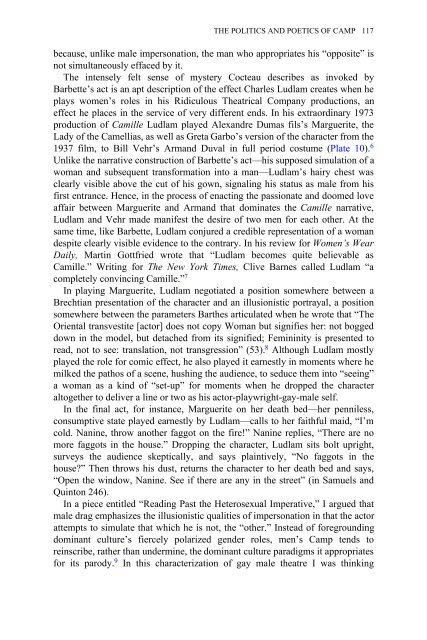Edited by Moe Meyer - Get a Free Blog
Edited by Moe Meyer - Get a Free Blog
Edited by Moe Meyer - Get a Free Blog
Create successful ePaper yourself
Turn your PDF publications into a flip-book with our unique Google optimized e-Paper software.
THE POLITICS AND POETICS OF CAMP 117<br />
because, unlike male impersonation, the man who appropriates his “opposite” is<br />
not simultaneously effaced <strong>by</strong> it.<br />
The intensely felt sense of mystery Cocteau describes as invoked <strong>by</strong><br />
Barbette’s act is an apt description of the effect Charles Ludlam creates when he<br />
plays women’s roles in his Ridiculous Theatrical Company productions, an<br />
effect he places in the service of very different ends. In his extraordinary 1973<br />
production of Camille Ludlam played Alexandre Dumas fils’s Marguerite, the<br />
Lady of the Camellias, as well as Greta Garbo’s version of the character from the<br />
1937 film, to Bill Vehr’s Armand Duval in full period costume (Plate 10). 6<br />
Unlike the narrative construction of Barbette’s act—his supposed simulation of a<br />
woman and subsequent transformation into a man—Ludlam’s hairy chest was<br />
clearly visible above the cut of his gown, signaling his status as male from his<br />
first entrance. Hence, in the process of enacting the passionate and doomed love<br />
affair between Marguerite and Armand that dominates the Camille narrative,<br />
Ludlam and Vehr made manifest the desire of two men for each other. At the<br />
same time, like Barbette, Ludlam conjured a credible representation of a woman<br />
despite clearly visible evidence to the contrary. In his review for Women’s Wear<br />
Daily, Martin Gottfried wrote that “Ludlam becomes quite believable as<br />
Camille.” Writing for The New York Times, Clive Barnes called Ludlam “a<br />
completely convincing Camille.” 7<br />
In playing Marguerite, Ludlam negotiated a position somewhere between a<br />
Brechtian presentation of the character and an illusionistic portrayal, a position<br />
somewhere between the parameters Barthes articulated when he wrote that “The<br />
Oriental transvestite [actor] does not copy Woman but signifies her: not bogged<br />
down in the model, but detached from its signified; Femininity is presented to<br />
read, not to see: translation, not transgression” (53). 8 Although Ludlam mostly<br />
played the role for comic effect, he also played it earnestly in moments where he<br />
milked the pathos of a scene, hushing the audience, to seduce them into “seeing”<br />
a woman as a kind of “set-up” for moments when he dropped the character<br />
altogether to deliver a line or two as his actor-playwright-gay-male self.<br />
In the final act, for instance, Marguerite on her death bed—her penniless,<br />
consumptive state played earnestly <strong>by</strong> Ludlam—calls to her faithful maid, “I’m<br />
cold. Nanine, throw another faggot on the fire!” Nanine replies, “There are no<br />
more faggots in the house.” Dropping the character, Ludlam sits bolt upright,<br />
surveys the audience skeptically, and says plaintively, “No faggots in the<br />
house?” Then throws his dust, returns the character to her death bed and says,<br />
“Open the window, Nanine. See if there are any in the street” (in Samuels and<br />
Quinton 246).<br />
In a piece entitled “Reading Past the Heterosexual Imperative,” I argued that<br />
male drag emphasizes the illusionistic qualities of impersonation in that the actor<br />
attempts to simulate that which he is not, the “other.” Instead of foregrounding<br />
dominant culture’s fiercely polarized gender roles, men’s Camp tends to<br />
reinscribe, rather than undermine, the dominant culture paradigms it appropriates<br />
for its parody. 9 In this characterization of gay male theatre I was thinking


